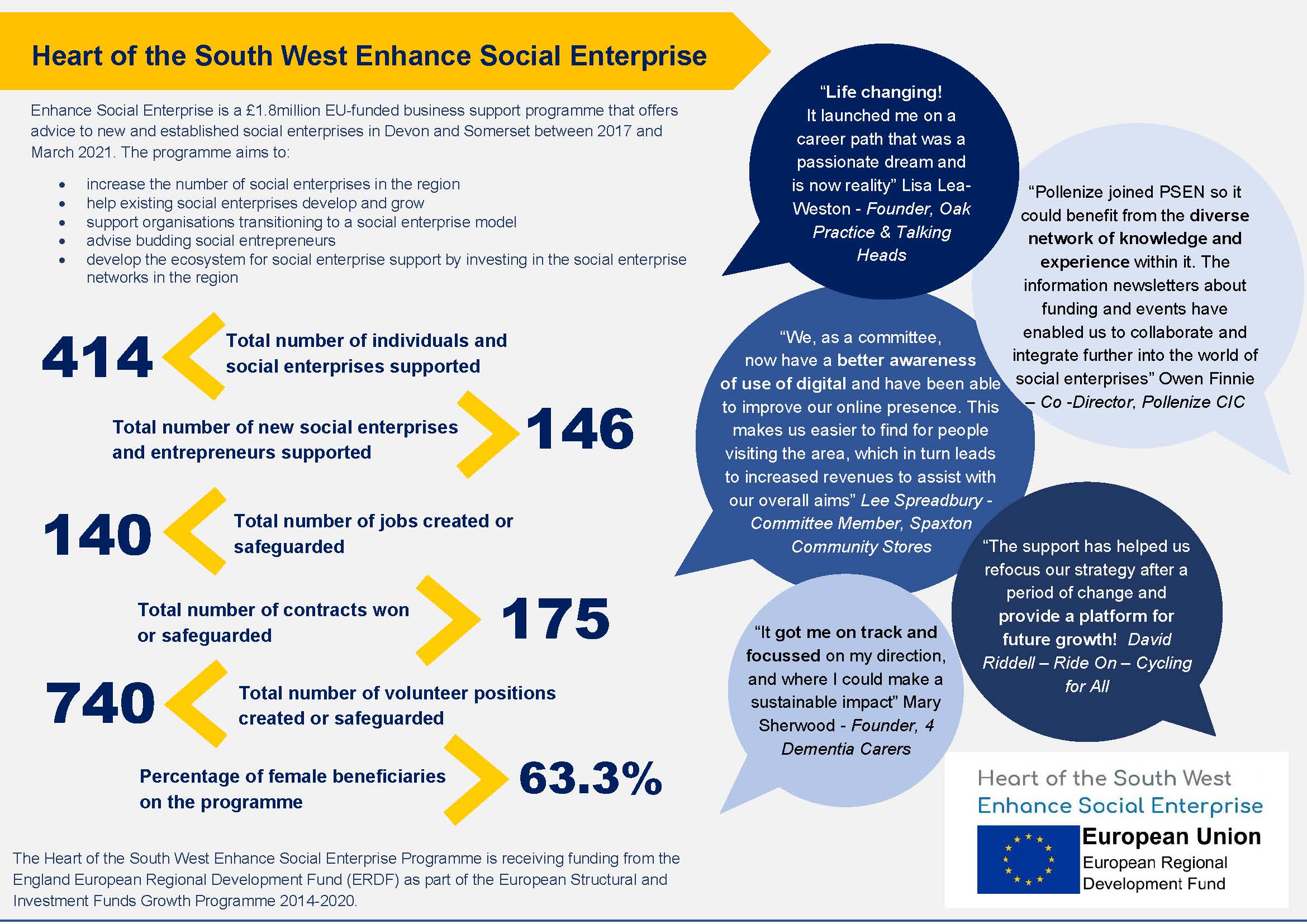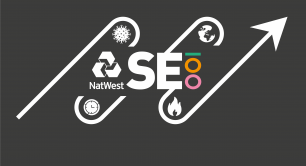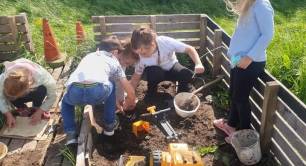ESE does it: how a social enterprise support programme can build a lasting legacy
What happens when £1.7m is invested in social enterprise locally? How best to support mission-led businesses and the social economy of a particular region?
This two-part series, in partnership with Devon County Council, explores what we can learn from the achievements of an EU-funded programme in the English counties of Devon and Somerset.
In part two, we reflect on some of the key findings from the ESE programme and how the experience could be used to shape support programmes and networks elsewhere.
Enhance Social Enterprise (ESE) was a £1.73m European Regional Development Fund (ERDF) programme offering specialised business support to aspiring, new and established social enterprises across Devon, Somerset, Plymouth and Torbay in the south west of England. At the same time, the programme aimed to strengthen the social enterprise ecosystem by investing in social enterprise networks locally. In the previous feature, we have seen how the project was born from the lack of targeted business support for social enterprises and a willingness to strengthen the local ecosystem for mission-driven businesses.
One of the aims of the ESE programme was to have a lasting impact once it ended. As part of achieving this, an independent report was commissioned to capture the social value of the programme and develop a ‘theory of change’ to explain what worked and why.
The report gathered feedback from participating social enterprises, the programme’s support and delivery partners, and from social enterprise networks that gave an indication of ESE’s achievements and areas for improvement. The need to understand and measure impact was highlighted as an important area to look at.
In practical terms, while the report’s authors collected a wealth of information showing the impact of individual social enterprises, they faced the common problem that social enterprises do not all measure their impact in a systematic (or similar) way, meaning that gathering the data to make general sector-wide conclusions was not possible. “The myriad of different approaches means that aggregating social impact information is almost impossible,” the report says.
However, the authors suggest that finding ways to bring the disparate information that is available into a ‘library’ resource could be very valuable for future learning. They also created an ‘asset map’ to help locate social enterprises across the region.
The report gathered feedback and insights from participating social enterprises, from the programme’s support and delivery partners, and from the region’s social enterprise networks.
Social Enterprise Spotlight: Neroche WoodlandersNeroche Woodlanders is based in the Blackdown Hills in Somerset. The social enterprise works with families and disadvantaged adults to improve their wellbeing by organising activities in the local woodlands. |
In-depth interviews with six of the 414 social enterprises that received support through the programme found that ESE had improved their understanding of the social outcomes that resulted from their activities.
In another survey of 44 participating social enterprises, the majority said ESE was ‘somewhat effective’ in helping them measure social value. Qualitative remarks from social enterprises reflected mixed views of how effectively they had been able to get to grips with social impact measurement, an issue that enterprises often find complex and challenging. Although there were lessons to learn about how – and how much – information could be absorbed during the programme’s skills-development training initiatives, being able to compare notes with other social enterprises on impact measurement was a key benefit. One respondent said that being able to meet and talk with other people in the same situation had been “very helpful” in learning about social impact monitoring. “This was because the person could see examples of how other people undertook such work, and could learn from them,” the report says.
In addition to impact measurement, those enterprises who received business support from ESE said the programme helped improve their general capacity and capability as organisations, in particular in boosting their management skills and knowledge. Two-thirds of those surveyed said they felt their organisation would be more robust as a result of the programme.

Focus on flexibility
Looking more closely at how the support programme was delivered, the report quotes support delivery partners saying they felt that the model functioned well if not perfectly. Being able to provide support to enterprises at any stage of their development (start up, scale up, establish) was welcome, but the report says that the funder’s requirement of a 12-hour format of support delivery set for the programme was not always best suited to the individual needs of some social businesses.
Gareth Hart, who is both director of the Plymouth Social Enterprise Network (PSEN) and of Iridescent Ideas, one of the support delivery partners, reflects that while it was positive that enterprises could access this support, in reality some organisations would have benefited from more than 12 hours and others from less – depending, for example, on their stage of growth and development. “We've got to find a way of being more creative and more innovative around how output is defined. Let's look at quality,” he says.
Hart adds that the general principle of setting and measuring outputs for this kind of programme is important: since the programme is using public money, it is normal that it is spent in a way that can be accounted for. “There's got to be accountability,” he says.
Social Enterprise Spotlight: Proper JobFounded in 1995 in reaction to a lack of recycling facilities available in the local area, Proper Job works to reduce waste by reusing, recycling and upcycling unwanted items. Based in Chagford, Devon, the enterprise also runs educational activities for the local community. |
Paul White, director at Essence of Exeter, adds that setting outputs for success also helped delivery partners to focus their activities. “You start with meaningful intent with a set of parameters that you're working towards,” he says. “And then as you go through you realise what works well, what doesn't work well, and learn from it… it enabled us to focus.”
However, Nora Corkery, CEO at Devon Communities Together, one of the partner social enterprise networks, also notes that focusing so much on specific targets – such as how many enterprises were supported, or how many events were organised – also meant that it was more difficult to maintain a strategic overview of the support required to make a longer-term impact for the social enterprise sector as a whole.
Receiving public funding also inevitably leads to an amount of bureaucracy linked to each level of government. In this case the public sector partners were Devon County Council, which was the accountable body for the programme, the Ministry of Housing, Communities & Local Government at central government level, and the European Commission as the key funder.
While the business support delivery went smoothly, the multiple levels of decision making sometimes made it challenging for all those involved to fully understand certain aspects of the funding and how it was allocated.
The key learning here, says Hart, was around how to build trust and transparency between social enterprise networks and public bodies, alongside ensuring that there was accountability for public money.
Long-term funding
Partly as a result of the programme, social enterprise networks are now calling for longer-term funding to be able to support local social enterprises consistently. Nora Corkery says that as funding comes and goes, her network’s activities go up and down – at times making it difficult to provide even minimal support for local social enterprises.
Long-term funding could fit in naturally as part of the levelling-up and “build back greener” government agendas, says Paul White. Social enterprises have a unique potential to deliver the positive social and environmental change the state is aiming to achieve, and he argues that there’s a case for ongoing funding to help networks deliver this. As the government is looking at a 10-year plan to deliver environmental change, he asks: “Why not budget for 10 years?”
If we want a greener, fairer economy, we've got to invest in the social economy and infrastructure
Hart says a small amount of funding each year would provide a secure base for social enterprise networks to build upon – although it is important for networks to remain entrepreneurial, prove their business model and strive towards sustainability rather than dependency. He adds: “If we want a greener, fairer economy, we've got to invest in the social economy and infrastructure. But we can’t have [this funding] for nothing, we've got to show how it worked and what we can deliver for it.”
The theory of change report also highlights the need for networks to have a sufficient number of members to be able to survive. “Achieving and then retaining membership is vital for sustainability, as is having a clear role and purpose,” the report says. Some networks, such as PSEN, have a paid-membership model, allowing it to have stable revenue. But networks in other areas might be better suited to a free-membership model, Hart explains.
Social Enterprise Spotlight: Double BounceDouble Bounce Inclusive Tennis South West provides tennis-based activities for people with a disability within the Plymouth area. Led by physiotherapist and tennis coach Fiona Murphy, the community interest company runs wheelchair tennis, tennis for players with learning difficulties, deaf tennis and walking tennis. |
Beyond connecting social enterprises with each other, the report says another role of social enterprise networks could be to provide a brokerage point into policy and government structures: “SENs could be a valuable conduit for discussions and information flow on behalf of social enterprises.”
Hart says more funding is needed to enable networks to play this role, as social enterprises themselves are too busy using their own funds to deliver their own mission. “There's not a lot of funding for middle tier of organisations that do the networking, the advocacy and the representation. I strongly advocate that any future programme must have that alongside business support on the ground.”
Polly Frost, project manager for the ESE programme at Devon County Council, says that moving forward, the issue of maintaining strong support for the social enterprise networks that have developed is an important focus for the council and all partners involved.
“A great deal of collaborative working between the social enterprise networks, the delivery partners and local authorities helped make ESE a success,” she says. “An investment on this scale undoubtedly leaves a hole.
“As we reach the end of ESE and reflect on the legacy of the programme, the challenge of sustaining the social enterprise ecosystem and providing social enterprise specific business support is paramount.”
The challenge of sustaining the social enterprise ecosystem and providing social enterprise specific business support is paramount
Frost says the Covid -19 recovery planning work currently underway provides opportunities for the sector who “are well placed to ensure recovery is inclusive, green and reduces inequality”. She adds: “Local authorities in the region are working collaboratively with partners across the voluntary, community and social enterprise sector to have meaningful conversations about how they can work together to provide skills and employment opportunities, support business, reduce inequality and work towards achieving carbon net zero. These conversations can be challenging and slow but really important to get the right support in right way.”
As far as business support is concerned, Frost acknowledges that the way forward goes right back to ESE’s raison d’être: business support not being available enough or suitably tailored for the specific needs of social enterprises.
“From a business support perspective, we need to continue to work together to resource the need for social enterprise-specific business support – specifically in relation to start up, accessing finance, legal structures and measuring social value,” she says.
But she adds that the future of business support for social enterprise must also focus on breaking down the “artificial barriers” between social enterprise and more traditional forms of business. “There are some areas of business support, such as marketing and digital, that can be delivered to all businesses and enterprises,” she says. “In the same way that social enterprise networks are tentatively working together with Chambers of Commerce, delivering business support that is accessible and relevant to many types of small business has the potential to break down artificial barriers between social enterprise and ‘other’ businesses. This tentative ‘mainstreaming’ would also make this work more sustainable.”

The Heart of the South West Enhance Social Enterprise Programme is receiving up to £986,503 of funding from the England European Regional Development Fund (ERDF) as part of the European Structural and Investment Funds Growth Programme 2014-2020. The Ministry of Housing, Communities and Local Government is the Managing Authority for ERDF. Established by the European Union, ERDF funds help local areas stimulate their economic development by investing in projects which will support innovation, businesses, create jobs and local community regenerations. For more information visit https://www.gov.uk/guidance/england-2014-to-2020-european-structural-and-investment-funds
This story was produced with some financial support from Devon County Council. Get in touch with our editorial team if you’d like to discuss working with us to tell social enterprise/investment stories from your local area.




